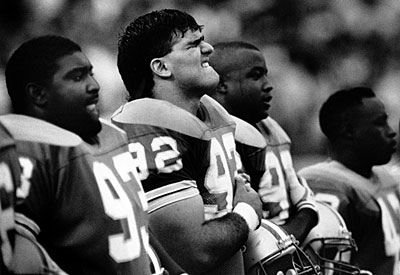But what is it about certain jabbermouths on the radio and ink-stained wretches in the newspapers that makes them find only the lead lining in even the whitest, puffiest cloud?
I'm not a University of Michigan fan by any stretch of the imagination. That comes from my inferiority complex of attending school at Eastern Michigan University, seven miles east on Washtenaw Avenue, and going to class under the dark shadow that U-M cast over EMU. But I've softened on U-M now. Still, I lean a little green when it comes to the two major universities in this state.
But Sharp's tirade in yesterday's Freep about U-M's place in the NIT -- playing for a second championship in three years -- and how it means not a hill of beans, was too much for even a lukewarm U-M person like me to ignore.
Sharp thinks the NIT is a waste of time, money, and India ink. He wrote that the South Carolina Gamecocks, who were gunning for their second straight NIT title, deserved a kick in the pants instead of a pat on the back. He called an NIT championship an oxymoron.
Kind of like "sportswriter Drew Sharp," I would say.
Sharp's beef -- and he has many, about many different things, at many times of the year -- is that the appearance of Tommy Amaker's basketball team in the NIT is an indictment of his program and should be treated with disdain and sneered at.
Anyone finding pride in this is a fool. This isn't worthy of celebration
and barely deserving of recognition. There's more shame than glory connected with the NIT's "grand" stage, more of an indictment of what has gone wrong with the Wolverines under Tommy Amaker's watch.
Participating in two NIT "championship" games in three years without gaining the slightest whiff of the NCAA tournament is an embarrassment worthy of ultimatums from the Michigan power
brokers. It's increasingly disturbing how rudderless the Wolverines too often look under Amaker, freely flowing to the whims of the tide.
My, my.
I don't know what the NIT did to Drew Sharp to draw such ire. Nor do I know what Amaker has wrought on Sharp, for even Drew admits, "He's a classy individual who runs a clean program."
But that's not enough, don't you know. More of Sharp's take:
And repeated NIT success doesn't equate to winning. This is passing off liver as top sirloin with the hope that with so few paying attention, nobody will recognize the discrepancy.
Maybe Drew Sharp would like to walk up to Daniel Horton, or any of the rest of them, crane his neck and look way, way up and say that winning the NIT doesn't matter.
Yes, the NIT is not the NCAA Tournament. If that's a news flash to anyone, then I'll chow on Sharp's column -- as long as you allow me some hot sauce. But it's still postseason basketball, and it does have a long history, and would Sharp have U-M participate and lose in the first round?
You know -- like MSU in the "real" college basketball tournament?
If you're going to play in the NIT, you may as well play to win. You still have an opportunity to make the final game of the season a victory. And U-M came close to making that happen.
As for South Carolina deserving a "kick in the back pockets" for having the nerve to win two NITs in a row, that's disrespectful to every athlete who's worked his or her tail off in practice, in the weight room, and on the field or the court or the rink in order to compete at the highest level that their situation will allow. It may not mean anything to the Drew Sharps of the world, but the NIT was South Carolina and Michigan's white whale, so what else is there to do but anything you can to slay Moby Dick?
I suppose you can, theoretically, make the argument that the NIT Champion is no better than the 65th best team in the country, though I think that's not terribly accurate. Could South Carolina have beaten a majority of the first-round pretenders in the NCAA tourney? Most likely. But even to be 65th when there are hundreds of Division-I basketball programs in the United States is really nothing to sniff at, when you do the math.
And Sharp is foolish if he thinks Amaker and his program is getting anywhere near a free pass in Ann Arbor by appearing in the NIT. Of course Michigan's standards are higher than that, and they should be. But I believe Amaker has U-M on the right path, despite stumbling toward the end of this season, pre-tournament. He'll take a few teams to the Big Dance when all is said and done.
It's just unfortunate that Sharp's poisoned mind -- as he is wont to do -- chose to use U-M's moment in the basketball sun, such as it was, as the time to defecate all over the school's basketball program.
But what else can you expect from someone whose glasses are forever tinted dark?




















